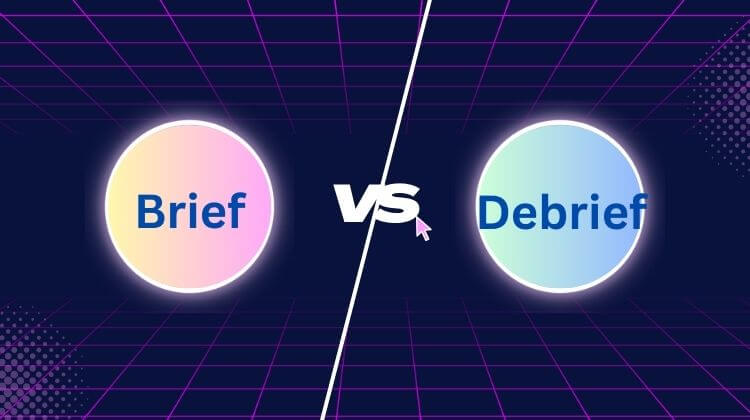As an Amazon Associate, I earn from qualifying purchases.

The terms “brief” and “debrief” play pivotal roles in various professional and personal contexts. They are two sides of a coin, representing different stages in decision-making processes, communication, and learning from experiences. Understanding when and how to employ each can significantly impact outcomes. This article delves into the intricacies of “Brief vs. Debrief,” shedding light on their meanings, applications, and the contrasts that set them apart.
Brief or Debrief: An In-depth Analysis
Brief: Setting the Stage for Success
A “brief” is a foundational document or communication that outlines essential information, goals, and expectations before commencing a project, task, or operation. It acts as a roadmap, providing all involved parties with a clear direction and purpose.
The Purpose of a Brief
A brief serves various purposes, including:
- Guidance: A brief provides a clear vision, ensuring everyone is aligned with the project’s objectives and requirements.
- Clarity: It outlines roles, responsibilities, and deliverables, leaving no room for ambiguity.
- Efficiency: A well-structured brief streamlines the workflow by highlighting priorities and critical milestones.
- Scope Definition: The brief outlines the project’s scope, preventing potential scope creep that could lead to delays and budget overruns.
Debrief: Learning and Improving
A “debrief,” on the other hand, occurs after an event, project, or operation has concluded. It involves reflective discussions and assessments to extract insights and lessons learned for future enhancement.
The Significance of Debriefing
Debriefs are crucial due to:
- Insight Generation: Debriefs provide a platform to analyze successes and failures, fostering continuous improvement.
- Knowledge Sharing: They facilitate the transfer of knowledge and experiences, preventing repeating mistakes.
- Enhanced Decision-making: Insights gained from debriefs empower informed decision-making for subsequent endeavors.
- Team Building: Open discussions during debriefs promote teamwork and accountability.
Key Differences between Brief and Debrief
| Aspect | Brief | Debrief |
|---|---|---|
| Timing | Pre-event or Pre-task | Post-event or Post-task |
| Purpose | Guiding and Directing | Reflecting and Learning |
| Content | Project Goals, Expectations, and Guidelines | Performance Evaluation, Outcomes, and Lessons |
| Participants | Stakeholders, Team Members, Decision Makers | Participants, Observers, and Facilitators |
| Focus | Future-oriented | Past-oriented |
Applying Brief and Debrief in Real Scenarios
Project Management
Briefing:
In project management, a comprehensive project brief sets the stage for a successful venture. It outlines the project’s objectives, scope, constraints, and stakeholder expectations. By doing so, it creates a unified vision and minimizes potential misunderstandings.
Debriefing:
After project completion, a debrief offers a valuable opportunity to evaluate the project’s overall performance. What went well, what could be improved, and what challenges were encountered? Answers to these questions enable project teams to refine their processes and strategies for future endeavors.
Military Operations
Briefing:
A mission brief is essential in military operations before embarking on a mission. It covers mission objectives, tactics, enemy intelligence, and roles within the team. This ensures that all soldiers know their tasks and the overall mission goal.
Debriefing:
Following a military operation, a debrief is conducted to analyze the execution. This includes evaluating the success of mission objectives, identifying areas for improvement, and capturing valuable intelligence for future missions.
FAQs
What is the primary purpose of a brief?
A brief’s primary purpose is to provide clear guidance, direction, and expectations before initiating a project or task.
Can debriefing only be done in a professional setting?
No, debriefing can be applied in various contexts, including personal experiences, to learn and improve from past events.
How often should debrief sessions be conducted in a business setting?
The frequency of debrief sessions depends on the nature and volume of projects. Generally, they should be conducted after significant events or projects.
Is a brief the same as a summary?
While both involve condensing information, a brief focuses on outlining goals and expectations, while a summary recaps the main points of an event or content.
Are debriefs conducted only when something goes wrong?
No, debriefs are conducted irrespective of whether an event went well. They aim to extract insights for continuous improvement.
Conclusion
Ineffective communication, decision-making, and learning from experiences, understanding the distinction between “brief” and “debrief” is paramount. A well-structured brief paves the way for successful endeavors, while a thoughtful debrief extracts valuable insights for future growth. In project management, military operations, or other contexts, embracing both processes can lead to enhanced outcomes and continuous improvement.





